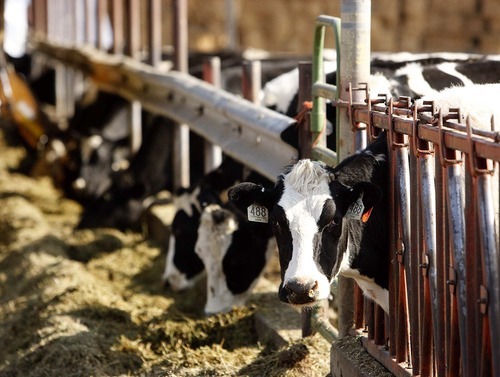This is an archived article that was published on sltrib.com in 2012, and information in the article may be outdated. It is provided only for personal research purposes and may not be reprinted.
After years of failure, a bill was passed out of a legislative subcommittee Tuesday that frees up money to boost chronically underfunded programs aimed at preserving Utah's vanishing farmlands.
Sen. Scott Jenkins, R-Plain City, unveiled SB46, which would pay farmers who are willing to sell development rights so their lands can be kept in production.
The funds to preserve Utah farmland would be paid for from taxes counties already collect in so-called rollback taxes, Jenkins said during a hearing before the Senate Natural Resources, Agriculture and Environment Committee. When agriculture property is sold to developers, the farmer or developer must pay several years of back taxes at the higher residential rate. Money from these rollback taxes, in turn, typically goes into a county's general fund, to the tune of $8 million to $10 million annually statewide.
Under SB46, rollback taxes instead would accrue within each county. As the fund grows, the county could adopt a plan to use rollback taxes to buy conservation easements. Although only lands in production would be eligible, a local elected board would select parcels to be added to the preservation program.
Board members would come from Conservation Districts, which grew out of the time of 1930s Dust Bowl, when soil erosion created an ecological disaster. Today, districts provide technical assistance to protect land and water resources.
SB46, called the Agriculture Sustainability Act, is supported by state Agriculture Commissioner Leonard Blackham.
He acknowledged that similar efforts to preserve farmlands through conservation easements have failed because programs were not optional and easements were in perpetuity. Under SB46, the program is optional for less-populated rural counties, and conservation easements on lands may be for a minimum of 30 years, up to perpetuity
"This is not a solution, but it is a good beginning," said Bruce Karren, a retired Cache County dairy farmer who supports the bill because of the provision that landowners may opt for 30-year conservation easements.
During the past 40 years, Utah has lost farmlands that equal the size of Delaware and Rhode Island combined, according to the U.S. Department of Agriculture.
Twitter@DawnHouseTrib —
Agriculture Sustainability Act
Sen. Scott Jenkins, R-Plain City, is sponsoring SB46 to preserve Utah farmlands. Under the bill:
Taxes collected when farmland is developed would be earmarked to buy development rights from other farmers who want their property to remain in agricultural production.
Counties receiving these taxes would place the money into a fund to pay farmers and ranchers who are willing to place a conservation easement on their property so the land cannot be developed for a minimum of 30 years, up to perpetuity.
County boards would select properties to be placed in the program, and only productive farmlands would be eligible.
Additional hearings would be required before critical farmlands could be cut up for roads or condemned.



